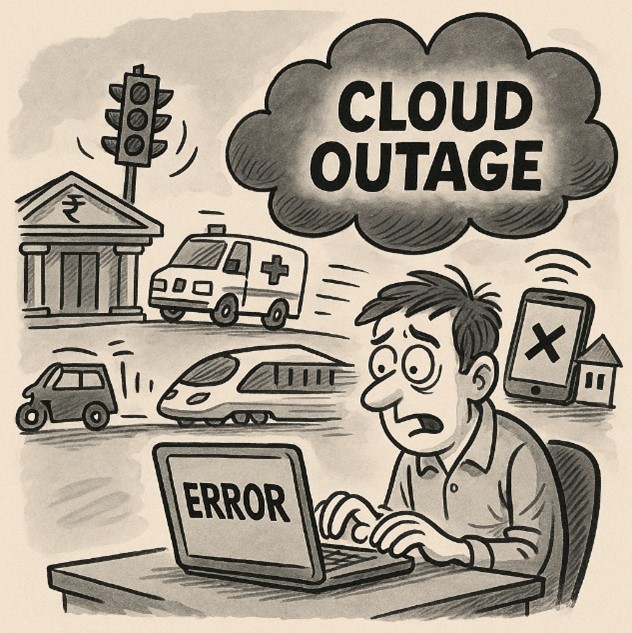



An invisible outage that revealed how visible our dependence has become.
By Ravishankar Kalyanasundaram
What Happened
A few hours of silence in the digital sky was enough to bring the world to a pause. Amazon Web Services—the invisible backbone of much of the internet—went down, and with it, a large part of modern life froze. Apps we use without thought—Netflix, Spotify, food deliveries, airline bookings, even financial dashboards—stopped responding.
It wasn’t a cyber-attack. It was a fault in one corner of a vast global system. But that tiny glitch reminded the world how deeply our lives, economies, and governments are now wired to servers we do not own and can barely understand.
When the Cloud Sneezed, the World Caught a Cold
The outage did not spare India. From Mumbai to Chennai, users complained of being locked out of platforms, orders and payments stalled, and businesses that depend on cloud-linked apps losing hours of work. It was not catastrophic, but it was a warning: we did not escape—we were merely lucky.
Think for a moment what would happen if such an outage struck at noon on a weekday.
Payments could freeze, hospitals might lose access to patient data, transport and ticketing portals could blink, and public grievance or ration platforms might simply vanish from screens. When the cloud coughs, the country catches a cold.
A Fragile Architecture of Convenience
This isn’t the first time. Over the past few years, global networks have stumbled more than once—sometimes for minutes, sometimes for hours. Every time, the same question echoes: how much of our progress depends on systems we neither built nor control?
The convenience of the cloud made us forget its fragility. Governments host citizen data, companies run factories and supply chains, and even homes now run doorbells, thermostats, and entertainment through remote servers. When a single region in a foreign country falters, the world blinks in unison.
Leading a modern nation without hyperscale clouds is unrealistic.
But leading with blind dependence on one provider or one region is unsafe.
It is like running an entire city on a single power line and hoping it never fails.
What Other Nations Are Learning
Around the world, governments are quietly drawing lessons. The European Union now forces financial institutions to map their digital dependencies and test for resilience. The United States runs simulation drills for federal agencies. China has chosen another path, building its own national cloud systems under tight domestic control.
Each country is finding its own balance between openness and security. What they share is a recognition that cloud resilience is no longer a matter of technology—it is a matter of national stability.
India, too, must draw its own lessons. We have built a proud digital economy, from UPI to GSTN, from e-courts to online classrooms. But as the recent outage showed, our strength is also our vulnerability. We depend on networks that are both global and fragile. Like other nations, we must now build our own safeguards—quietly, firmly, and fast.
A Moment for Foresight
This is not a call for alarm, but for foresight. The Government would do well to look at the cloud the way earlier generations looked at electricity or railways—as infrastructure too vital to be left to chance. It must ensure that essential services—banking, health, power, communication, and governance—can stay on their feet even when a server far away collapses.
India has the talent and the vision to build such resilience. What is needed now is intent—a recognition that the next global glitch could just as easily be our own.
Governments, regulators, and public enterprises should together evolve common standards, so that the country’s digital foundation is not a house of cards. The Centre and the States must treat reliability as policy, not an afterthought.
And as part of this awakening, the nation needs to rehearse its own digital reflexes—just as offices conduct fire drills, we need “cloud drills” to test how quickly our systems recover. Preparedness is no longer a technical exercise; it is civic discipline.
The Thought That Lingers
When the outage passed, the world logged back in and life resumed—as if nothing had happened. But the silence left behind a question that lingers:
If so much of what we do, earn, and hope for depends on unseen machines in distant lands, how prepared are we for the day those machines stop?
Because progress without resilience is merely convenience in disguise. And without resilience, convenience can descend into chaos in no time—and history, as always, will remind us ..What can happen…will happen.